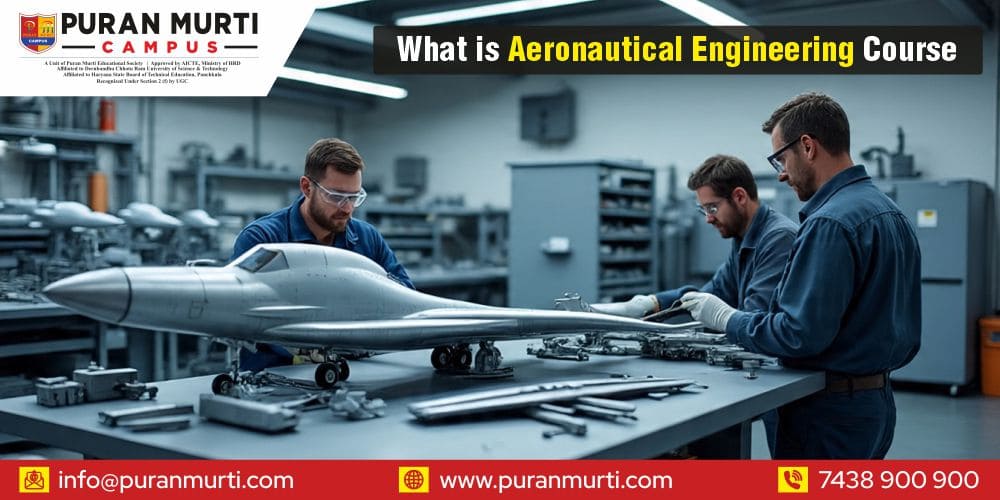What is aeronautical engineering course
Posted on : 9 September, 2025 3:52 pm
Selecting the most suitable career option after 12th is among the largest decisions of a student’s life. And if you are interested in airplanes, rockets, satellites, or even drones, Aeronautical Engineering may be your dream course. It’s a part of study where science and your idea blend together, and where your wonder about “how things fly” becomes a career that can literally take you beyond the clouds.
In this blog, let’s take a detail dive into What is aeronautical engineering course, the detail course structure, eligibility criteria, scope for career, fees, and why it is one of the most thrilling branches of engineering to pursue.
Introduction to Aeronautical Engineering
The subject and profession of Aeronautical Engineering include the design, development, testing, and manufacturing of aircraft and aircraft systems. From tiny drones and commercial airliners to state-of-the-art military jets, these aeronautical engineers enable them to fly and make them safe and efficient.
Unlike many other engineering streams, this course is adventurous and futuristic. It’s not just about machines—it’s about exploring the skies, innovating technologies, and contributing to industries like aviation, defense, and space research.
Course Overview
An Aeronautical Engineering course is generally offered at the undergraduate (B.Tech/B.E.) level, and it may extend to postgraduate (M.Tech/M.E.) and research (PhD) levels for students who want to specialize further.
Key Subjects You’ll Study:
-
Aerodynamics – the flow of air around wings and bodies.
-
Aircraft Structures – student learn the framework of airplanes and how they support loads.
-
Propulsion Systems – they can work on engines, turbines, and jet propulsion.
-
Avionics – aircraft electronic systems.
-
Flight Mechanics –how can is flight stability, control, and performance.
-
Space Technology (optional) – rocket and satellite basics.
It is a combination of theory, practical labs, and real time thrilling projects. Think of creating a mini plane at college or conducting simulations to see if a jet engine functions!
Eligibility Criteria
If you’re going to study Aeronautical Engineering after 12th, here’s what you’ll need:
-
Educational Qualification: Completed 12th with Physics, Chemistry, and Mathematics (PCM).
-
Minimum Marks: Most colleges need a minimum of 50-60% in PCM (may differ from institution to institution).
-
Entrance Exams: student take Admission is normally through exams such as JEE Main, JEE Advanced, or state-level engineering entrance exams.
Some private universities and college also hold their own entrance tests like puran murti take your own exam PMCET.
Admission Process
-
Take the engineering entrance exams.
-
Apply to college and universities form that provide Aeronautical Engineering.
-
Get admission on merit based or entrance exam ranking.
-
After that Do counseling and admission procedures.
Fees Structure
The fees for the course of Aeronautical Engineering are different based on the college type:
-
Government Colleges: ₹50,000 – ₹1.5 lakh annually.
-
Private Colleges: ₹1.5 lakh – ₹4 lakh annually.
Despite seeming like an investment, we should not forget that the course gives you lucrative and high-paying jobs in the aviation and aerospace sectors.
Job Profiles after Aeronautical Engineering:
Here begins the thrill. Once you are a graduate in aeronautical engineering, you can proceed towards career opportunities in:
-
Commercial Airlines – Cooperate with organizations such as Air India, Indigo, or international airlines.
-
Aircraft Manufacturing Companies – there are many company like HAL, Boeing, Airbus, etc.
-
Defense Sector – DRDO, ISRO and also Indian Air Force.
-
Space Organizations – the Research and development for rockets and satellites.
-
Maintenance, Repair, and Overhaul (MRO) Companies – Maintaining aircraft safety and efficiency.
Popular Job Profiles after a Aeronautical Engineering:
-
Aeronautical Engineer(AE)
-
Aircraft Design Engineer(ADE)
-
Aerospace Technician
-
Avionics Engineer
-
Flight Safety Officer
-
Research Scientist
Salary Scope:
-
Freshers salary approax: ₹4 – ₹8 LPA (Lakhs Per Annum)
-
Experienced Professionals salary : ₹10 – ₹20+ LPA, depending on expertise and industry.
Why Choose Aeronautical Engineering?
Here are some reasons why this course stands out:
-
You get to work in a cutting-edge industry where innovation never stops.
-
It offers opportunities to contribute to join a national defense and space exploration.
- The career is adventurous and prestigious.
-
You can be part of projects that literally change the way humans travel and explore.
A Note on Colleges
When selecting a college to pursue Aeronautical Engineering, always seek the following:
-
College is AICTE/UGC approval
-
Qualified and experienced faculty
-
college connection with Industry collaborations and internship
- Placement records
Puran Murti Vidyapeeth is one such campus in India which has proved its excellence in technical education; it is providing technological labs, practical training, and scope for students to work on practical projects such as Hybrid Go-Karts, F1-style cars, and experiments in aerodynamics. This campus is more than just technical education; it is concerned with personality development and entrepreneurship, preparing students of potential to be ready for opportunities anywhere in the world.
Student-Friendly Perspective
Learning Aeronautical Engineering is not all about textbooks—it’s about passion. Students usually narrate their experience as one of excitement because they have practical exposure, work on labs using actual aircraft components, and sometimes even get to go to airports or factories.
It takes commitment, but if you really enjoy airplanes and technology, you’ll find all topics fascinating. And the best news? You’ll always have something fun to tell people when they ask, “So, what do you do?”
Conculsion
Aeronautical Engineering is not just a course—it’s a doorway to the future of the world of aviation and space. If you have visions of designing the next Boeing 777, being part of India’s space mission, or monitoring the safety of flights around the globe, then this is the field for you.
So, if you are a student at the juncture of career choices, and your heart beats fast every time you catch a glimpse of an airplane flying overhead, take it as a sign—Aeronautical Engineering could be your calling.

